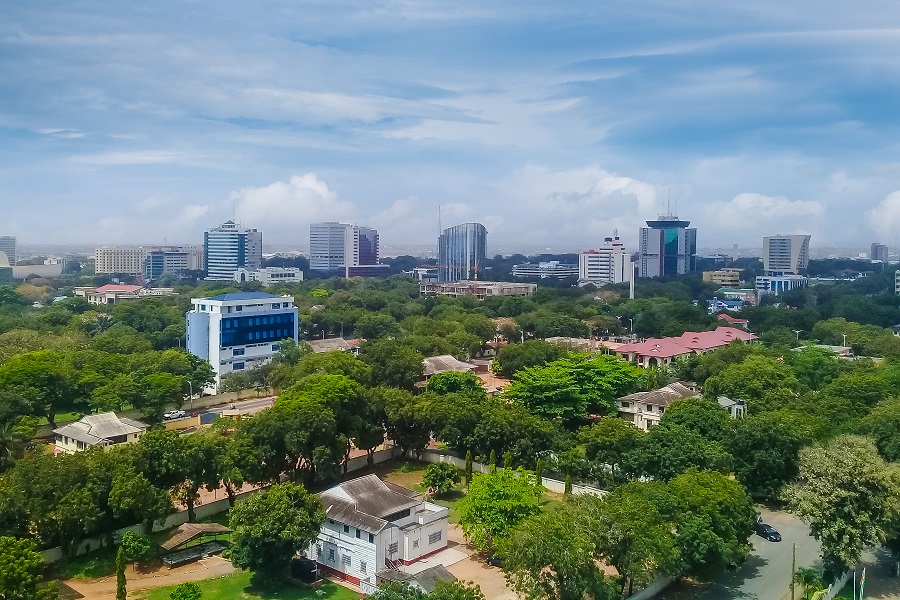The Role of Parliamentarians in the Management of Tax Expenditures in ECOWAS Member States
Jules Tapsoba | 22 November 2024
Fiscal, Blog | Tags: Africa, ECOWAS, Parliaments, Tax Expenditures
This article is part of a blog series on the critical role of parliaments in tax expenditure policy making. The contributing authors include members of parliament, government officials, and further experts in the tax expenditure field. Additional blogs in the series are available on the Philippines, the Netherlands, the United States, Zambia, and California. The introduction to the series is available here.
The French version is available here.
Tax expenditures, defined as public spending through the tax system with measures such as exemptions, deductions, reduced rates and tax credits, can have a significant impact on public finances. Estimating the cost of these measures is crucial to improve tax policy and ensure an optimal allocation of public resources.
Although technical experts from ministries responsible for fiscal policy and tax authorities often lead the estimation work, parliamentarians play an essential role throughout the tax expenditure policy cycle.
Since 2018, the Economic Community of West African States (ECOWAS) has introduced reforms to harmonise and improve the management of taxes and duties for the benefit of the Commission and its Member States. Among ten documents adopted on 7 July 2023 during the Conference of Heads of State and Government, Directive C/DIR.04/07/23 regards the harmonisation of methodologies for estimating the cost of tax expenditures in ECOWAS Member States.
ECOWAS’ approach to tax expenditure management
Since January 2012, member countries of the West African Economic and Monetary Union (WAEMU) have complied with the Community Directive No. 01/2009 of 27 March 2009 on the code of transparency in the management of public finances within the Union. For all countries, with the exception of Guinea Bissau, tax expenditures are assessed annually, and related tax expenditure reports are produced regularly.
The Decision 08/2015/CM of 2 July 2015 establish the methodology for estimating tax expenditures in WAEMU Member States and is applied by most Member States. By 2021, all ECOWAS countries (except Ghana, Cape Verde, Guinea Bissau, Liberia, The Gambia and Niger) were complying with the provisions of Article 11, which requires the publication of annual tax expenditure reports submitted to Parliament. However, this is not always the case for countries in the West-African sub-region which are outside the WAEMU. For example, Nigeria, Cape Verde, The Gambia and Guinea Bissau have only been experimenting with methods for estimating revenue losses linked to the granting of tax and customs concessions since 2021.
Tax validation requests, the adoption of directives and the role of parliamentarians in ECOWAS
ECOWAS Member States are invited to adopt the guidelines about tax expenditure estimation in their national legislation. It is important to emphasise the important role parliamentarians play in defining regional guidelines (for example, in the ECOWAS Parliament) and for the adoption of national laws (in their role as Members of the National Assembly). They are responsible for defining the rules for implementing mechanisms to estimate and monitor tax expenditures.
The ninetieth Ordinary Session of the ECOWAS Council of Ministers, held on 6 and 7 July 2023 in Bissau, Guinea Bissau, brought together ministers responsible for regional integration and finance. During their deliberations, they adopted ten regulatory texts as part of the consolidation of the legal architecture behind the ECOWAS Customs Union and tax harmonisation. These texts include two Directives on tax harmonisation: (i) the Directive for harmonising the legislation of ECOWAS Member States on Value Added Tax (VAT), and (ii) the Directive for harmonising the methodology for estimating tax expenditures.
i. Directive for harmonising laws of ECOWAS Member States relating to VAT
The objectives of the VAT reforms adopted by ECOWAS are: (i) to modernise VAT administration, (ii) to improve the revenue from and efficiency of the VAT, and (iii) to strengthen the operational capacities of Member States for better mobilisation of domestic revenue within the current context of trade liberalisation and tariff dismantling. The main points in the VAT Directive are as follows:
• The introduction of a new paradigm advocating for a broader tax base for VAT.
• Combating double taxation of transactions within the ECOWAS area by introducing a destination principle for VAT applied to intra-Community transport.
• The proposal of a list including ten basic necessities for which Member States have the option of taxing them at a reduced rate. In addition, the directive relating to tax expenditures recommends that the socio-economic impact of measures relating to reduced rates should be assessed.
• Drawing up a regional practical guide on VAT to facilitate the uniform interpretation and application of the VAT Directive.
ii. Directive for harmonising the methodology for estimating tax expenditures in ECOWAS Member States
The tax reforms undertaken by ECOWAS to harmonise estimation methods and better governance of tax expenditure have two main objectives: (i) facilitate informed decision-making by strengthening governance and transparency, and (ii) to control the number of tax exemptions and incentives in order to significantly increase the mobilisation of domestic tax revenues.
The Directive C/DIR.04/07/23 for the harmonization of methodologies for estimating tax expenditures in ECOWAS Member States commits ECOWAS parliamentarians to the key areas of tax expenditure management. It contains the following elements:
• Reference elements for the new objectives of fiscal transition include national assessments of revenue shortfalls, which now encompass assessing the impact of exemptions on (i) tax revenue, with explicit decisions about which exemptions are included in general law, (ii) economic incentives, (iii) equity and poverty reduction, and (iv) the quality of services provided to taxpayers.
• Reducing tax competition between West African countries by introducing mechanisms to ensure regional coordination of granting of tax expenditures.
• Elements of harmonisation of the benchmark tax system (VAT SFR defined in 2022). An approach aimed at gradually extending the scope of regional assessment has been proposed to Member States.
• Guidelines for a regional approach of estimating tax expenditures, by (i) consolidating the approach in a single regional document (ECOWAS) and (ii) introducing harmonisation measures and submit to the authorities for decision.
• A reference to the Estimation Methodology Guide, which has been tested and implemented in Member States (anchoring of the Tax Policy Unit, data sources, publication and dissemination of annual reports on tax expenditure, etc.).
• The existence of two harmonised tax and customs data collection grids appended to the Estimation Methodology Guide.
Next steps and room for improvement
a) Evaluation methods
If Members of Parliament have a good understanding of the methods used to evaluate tax expenditures, they are also better equipped to learn the relevance of the measures.
Member States of ECOWAS shall carry out in-depth analyses of the distributive effects of tax expenditures and their socio-economic impacts, which is complementary to the budgetary estimation of revenue foregone (Article 6 of the Directive). In general, estimation tends to focus solely on tax revenue foregone. This approach rarely includes economic studies or the social repercussions of tax expenditures. The lack of resources or the difficulty of accessing data are common challenges resulting in the lack of impact analyses other than the budgetary impact. However, such a gap is damaging insofar as the decision-making of national authorities tends to be based solely on the post-effects of tax exemptions in terms of lost revenues and, at the same time, to neglect their social and economic consequences.
b) Enhancing the return of tax expenditure evaluations
A greater emphasis on the social and economic effects would strengthen the weight of tax expenditure evaluations in the budgetary decision-making process. Often, due to a lack of reliable information, decision-makers (such as government authorities or members of parliament) are unable to grasp the extent of the social and economic consequences of tax expenditures. In such cases, decision-makers may be inclined to engage in extensive exemption policies. However, it is essential that parliamentarians assess whether tax expenditures are in line with national development objectives and priorities. They must assess the effectiveness of these measures in achieving their objectives for sustainable development in their territorial jurisdictions.
c) Transmission, publication and dissemination of tax expenditure evaluation reports
Annual reports on fiscal expenditure are transmitted to ECOWAS no later than three months after the adoption of the initial finance bill or the annual budget (Article 11 of the Directive). The annual report on tax expenditure is appended to the finance bill submitted to the National Assembly. This requires parliamentarians to engage with experts, civil society organisations and other stakeholders to better understand tax expenditure issues. Capacity building within parliament is crucial for effective oversight.
d) Communication initiatives
For countries that carry out tax expenditure reporting, communication is essentially limited to appending the tax expenditure report to the Finance Act. This procedure is essential in order to have all the budgetary documents needed for government decision-making and parliamentary consultation procedures.
However, due to its specific construction, this appended document is not easy to access for non-specialists. Furthermore, in some countries, such as Burkina Faso, Côte d’Ivoire, Guinea and Niger, the estimation report of tax expenditure is not made public or is not even attached to the Finance Act. These limitations go against the need to inform various entities (i.e. parliamentarians, civil society, public opinion, private and public companies) concerned by the cost of tax expenditures.
In short, the regional approach to estimating tax expenditures in West Africa is unique and original. It is based on the experience of countries in the WAEMU zone and on good practice in managing tax expenditure in English-speaking countries. The pooling of experiences has led to the development and harmonisation of tools for estimating and monitoring tax exemptions or incentives for investment.
Stakeholders affected by this initiative are tax and customs administrations, civil society organisations, academics and parliamentarians. By actively participating in the estimation of tax expenditures, parliamentarians can contribute to more efficient, transparent and equitable tax policies in West Africa. This requires a commitment to demanding reliable data and putting the long-term interests of their constituents first.
Building the capacity of these various players is based on full implementation of the new directive and the ECOWAS Practical Guide to Managing and Monitoring Tax Expenditure.
Tax experts can determine the distributional effects of VAT exemptions on consumer goods. These VAT exemptions are often used with the aim of reducing inequalities. However, it is not always clear if these exemptions achieve the desired objectives or not. To assess the relevance of VAT exemptions on the consumption of certain products, we must analyse the distribution of their effects across various groups in the population and seek the answer to “Who benefits most from these exemptions?”. If it is the wealthiest who benefit the most from these exemptions, Members of Parliament are invited to abolish them.




